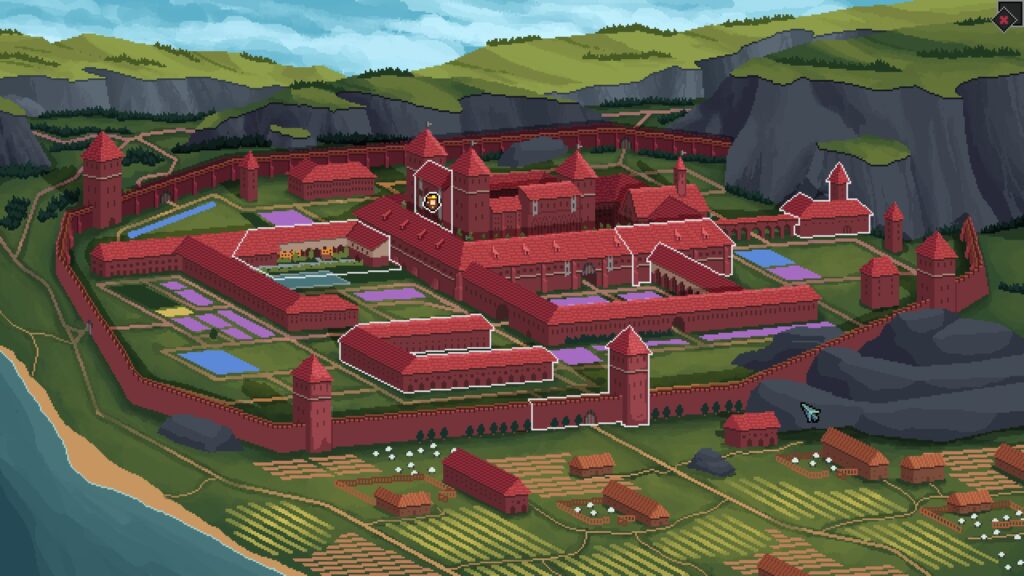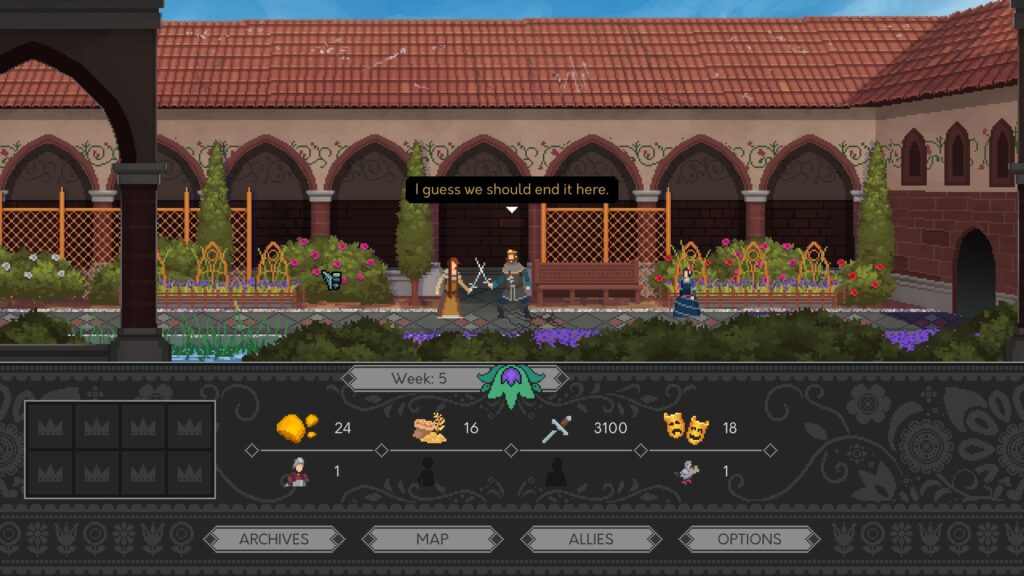
I’m a bit of a sucker for games that manage to combine mechanics with story in interesting ways, especially with this being about playing a king who has to balance the needs of his country and also his family. Unfortunately I don’t think this counts as one of the successful examples as too often it’s difficult to tell which outcomes are hardcoded to happen no matter what you do and how much your decisions actually matter. It’s also an odd combination of sometimes being cutesy and other times being horrifically dark. I laud its makers for their boldness in creating what is in effect a very grim fairy tale but in the end, this isn’t a game that really worked for me.
You are King Eryk, ruler of a kingdom that is neither very rich nor powerful. You have a queen and three daughters but no male heir. Despite your limited resources, your job is to listen to petitions from citizens and decide whether or not to help them solve their problems. You also want to keep your family happy of course with the middle daughter Asalia being especially a handful with her pranks and sneaking out of the castle. One day you receive news that hostile soldiers from a distant land called Radovia, is causing trouble. A message comes from a bandit who once forced Ivo to promise that he would give him his daughter’s hand in marriage. Now this bandit is seemingly the king of Radovia and has come with an army to enforce this promise. Your kingdom is too weak to resist the Radovians alone, so you must try to get your lords to contribute soldiers. Eventually a proposal comes from a neighboring king that your eldest daughter Lorsulia marry his son Ivo. With little other choice and despite Lorsulia’s misgivings, you are forced to agree.

Yes, Your Grace looks like an old style adventure game with pixel art and plays a lot like one too. There are kingdom management decisions to be made, sure, but many of them are in the form of dialogue options as you respond to petitioners in your throne room. Every week there’s a screen where you see a tally of your income and expenses and can choose whether to invest in certain projects. There’s also a map in which you can send agents, starting with your general, out in the world to accomplish tasks. It’s all very simple however and you only need to keep your gold and supplies resources in the black and try to keep your citizens as contented as possible. You can also send your agents out to help your citizens but this will naturally make them unavailable for other tasks for a time.
One of my issues with this is that, yes, it is indeed very simple and yet on the other hand, even small decisions might matter. Or it might not. It’s impossible to know beforehand. For example even when your petitioners come to make seemingly trivial requests, like finding a missing animal, it’s usually a good idea to indulge them if you can afford it. Raising contentment seems to increase your tax income but as the game mechanics aren’t explicitly spelled out, you can’t predict how much it matters. It may be tempting to just role-play it, buying gifts for your children as you please or helping peasants whose problems seem particularly acute. The problem is that resources in the game are tight enough that it’s impossible to please everyone and some of the upgrades and investments that do make a big difference can be extremely expensive.

It’s not much of a spoiler to say that the pivotal moments in this game are a couple of big battles. Even now after completing the game, I can’t say for sure if how big the army you bring matters or if it’s all scripted to end up the same way. Certainly the outcomes for your family members can vary based on your decisions but it’s not at all clear to me that it’s because you’re better at managing your resources. So to me this is kind of like the worst of both worlds: it’s hard to tell how much game mechanics change the story outcomes and it’s also hard to tell how story decisions will impact your resource on the current and future turns.
I do credit the writers for coming up with a story that doesn’t pull its punches. The youngest daughter Cedani’s fixation on pets seems adorable at first but the story isn’t afraid of going into some really dark places with them. I think this title actually does seem some kind of content warning. The light presentation lulls you into thinking that this might be a children’s game but it really, really isn’t. That said, I’m not saying that it’s a really good story. It follows the story beats of the old-fashioned grim fairy tales in which even children can and do get killed by the dark horrors in the woods.

Overall this was not at all the game I’d hoped it would be and I’d rate it mediocre at best. The story options are too constrained to allow the game mechanics to change them enough to feel meaningful. Apart from being darkly medieval, the game world doesn’t have a distinctive enough personality either. I’m willing to cut small independent games but this one doesn’t work for me at all.